Most of us have a wellness issue we spend a great deal of our lives working with. For me, it’s anxiety. I’ve always been an anxious person, and one of the reasons why I have dedicated my life to plant medicine is that it’s been the single most effective tool I’ve worked with to help find my calm. In this post I’m going to talk about a few of my favorite herbs to help with anxiousness, and share an herbal tea for anxiety recipe that has become my personal favorite.
For many of us, anxiety is more than just an emotion that passes as quickly as a sneeze. Anxiety and anxious feelings can be an all-the-time issue we deal with that affects how we feel, how we think, what we’re able to do, where we can go, and who we can be with. Like depression and other imbalances that reside in the mind and heart, anxiety is often deeply rooted – and I have found that it tends to show up most often in people who are naturally sensitive, hyper-aware, intuitive, and compassionate.
While anxiety can seem impossible to deal with, there’s good news. It’s a pattern – a learned way of responding to the world within and without. This means that, with hard work and dedication, we can change it into a pattern that doesn’t cause is so much trouble. We can learn to be in our center and respond to life in ways that are much more calm, nurturing, and safe for us.

There are many faces to anxiety, and many ways in which herbal tea for anxiety can be a true ally in our deep healing. Some of the ways I most often see anxiety affect people include:
- General feelings of discomfort
- Aches and pains
- Feeling dissociated, disconnected, or out of place
- Panic attacks
- Mood swings
- Anxious patterns like agoraphobia, avoidance, and superstitions about safety
- Issues with connecting to other people, or feeling safe doing so
- Intense worries about health, relationships, finances, or spirituality
- Thought patterns that focus on ‘what if’ scenarios that are often catastrophic or negative in nature
- Assumptions about the future, or anticipation that things won’t be safe, calm, or positive
There are many other things that could be added to this list because each individual person has their own version of anxiety. The point here is that anxiety is more than an issue ‘in your head’. It can influence all areas of your life and is a very real, very painful issue for the people who live with it.
The good news is that plant medicine is a wonderful support for anxious people. Plants, like many of us, are gentle. They work in ways that don’t feel overwhelming, numbing, or forceful. They can become true friends who are part of our everyday wellness plan – and they work really well with talk therapy and many other modalities of mental heath and healing.
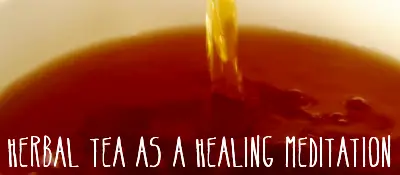
The mind is the fuel that fires anxiety. Anxious patterns can be stored in the tissues and cells of our bodies, but it’s ultimately our thoughts that keep anxiety patterns alive and well. For this reason, one of the best ways to stop acute episodes of anxiety and train us out of bigger patterns of long-term anxiety is to work with the power of the mind to make positive, healing changes.
While it may seem simplistic, the act of brewing up a cup of herbal tea for anxiety can have far reaching effects if you know how to approach it. Making tea can be a moving meditation that helps the mind shift into a new state of healthier operation. When we choose to brew healing herbal tea, we are making a conscious choice to do something good for ourselves. We know the herbs are healing, so when we decide to bring them into our lives we are cultivating confidence, esteem, and self- love – all very healing medicines for the anxious person.
While we choose herbs and brew tea, we can choose to step into a mindset of gratitude, hope, and love. We can focus our intention on how grateful we are for the support the herbs give us, and there’s even space here to being in spiritual practice like prayer, something shown to have profound effects on feeling more calm and positive.
The whole process of making tea is a natural ritual that can help give our minds and emotions something positive, uplifting, and optimistic to focus on. This makes us feel better right now while making room for new, healthier patterns and responses to set in. If we turn to herbal tea during times of anxiety, we start creating a powerful new pattern that speaks of our deserving the be healthy, happy, and peaceful. Soon, instead of the old panic patterns coming up as a reaction, we may simply find that we know it’s time to take a break, take a breath, and enjoy some herbal tea.
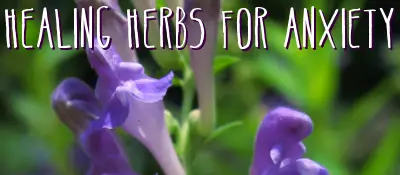
Here are some of my personal favorite herbs to work with when anxiety becomes a problem. Each of these herbs has its own special gifts, and they’re all worth our attention. Further down the page I’ll share some herbal tea for anxiety recipes that you can make easily in your own kitchen using combinations of herbs that are really effective.
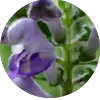 Skullcap Scutellaria lateriflora
Skullcap Scutellaria lateriflora
Skullcap is one of my absolute favorite herbs to use for all types of anxiety. It helps calm the mind and balance the thoughts while acting as a nerve tonic that trains us on new ways to react to the situations that may trigger our anxious patterns.
With great speed and gentleness, Skullcap relaxed the nerves, relieves tension in the mind, soothes the nervous system, and calms the whole system. This herb is gentle, regarded as safe, has a flavor that blends well with any other herbs.
For a simple yet profoundly effective herbal tea for anxiety, combine 3 parts Chamomile with 1 part Skullcap. Easy!
Find Organic Skullcap
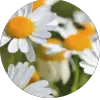
Chamomile Matricaria chamomilla
One lesson I learned very early on in my professional studies as a clinical herbalist was to never underestimate the power of chamomile. This humble flower, so common and unassuming, is one of the most amazing supporters we can have for a nearly endless variety of issues.
Chamomile is calming for body, mind, and emotions. It is gently relaxing for the body while calming the mind at the same time. In anxious people, the body and mind often feed off of one another – body tension causing the mind to be more alert, mental agitation causing the body to be more tense. Chamomile steps in with its delicious flavor and helps stop that cycle.
Chamomile, while being sweet and apple-like in flavor, also has bitter properties which is why it’s used so often in digestive and stomach complaints. The bitter taste directly affects the digestive system and can do wonders for an anxious stomach. Bitter tastes also help activate the parasympathetic nervous system which puts a check on the sympathetic nervous system – the one responsible for the fight or flight response.

California Poppy Eschscholzia california
California Poppy is one of my favorite herbs to work with when a person needs deep, multifaceted, lasting relaxation. A non-addicting and non-narcotic relative of the opium poppy, California Poppy is a sedative herb that helps ‘turn down’ thoughts, emotions, and sensations that may be overwhelming. It’s a wonderful, gentle herb for people who have anxiety that really affects every part of their lives. This lovely flower brings calm to all levels of the being and can help break those anxiety cycles that build upon each other until panic happens.
I use California Poppy in small amounts as part of a bigger blend. See the recipe below for an example of how to get the best from this flower without getting groggy.
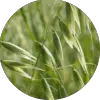
Oatstraw Avena sativa
Oatstraw is one of the most important herbs to work with if you deal with recurring or long-term anxiety. In addition to being very comforting and calming by nature, it also delivers some very important nourishment to the nervous system. Oats are like food for the nerves – they help us rebuild from the often destructive effects of stress and anxiety while toning up the nervous system so that we’re more resilient and better protected in the future.
A big pinch of Oatstraw in any anxiety herbal tea blend is a simple way to get relief from nervous fatigue, stress, exhaustion, depressive feelings, burnout, and anxiety. I also suggest adding oatmeal to your diet as a wonderful nourishing food.
While a tincture made from the fresh milky tops of the oats plant is best as a more intensive tonic, using just plain Oatstraw is a wonderful addition to herbal teas and I use it all the time. The straw I prefer is harvested at the right time of year and is dried in a way that preserves the important nourishment for the nervous system.

Passionflower Passiflora incarnata
One of the most overlooked aspects of working with anxiety is sleep. If we aren’t sleeping deep, long, and well, we are not going to deal with anxiety properly. Sleep is essential – but when it comes to anxious issues it’s perhaps one of the most important parts of the puzzle. Many people who live with high anxiety find relief by taking naps during the day, and more people than I want to admit rely on sleeping pills to get the deep sleep that makes them have a calmer day tomorrow.
Passionflower is an herb that I rely on often when sleep isn’t what it should be. Passionflower helps us drift into deep, peaceful, restorative sleep while also lending some very nice calming effects. It doesn’t have the zombie-like effects of many sleeping pills, and you won’t wake up feeling groggy and disconnected tomorrow. It’s very gentle, easy on the system, and works mostly by allowing the mind and body to slow down enough so that you can doze off.
You can add a small amount of Passionflower to pretty much any calming herbal tea blend to get its sleepy benefits, and enjoy it 30-45 minutes before bedtime. It goes great with the recipe below. Just add one part of it to transform the recipe into a sleep-specific formula.
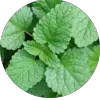
Lemon Balm Melissa officinalis
Mood is essential to dealing with anxiety. People who suffer from high levels of stress and anxiety are prone to feelings of sadness, despair, worthlessness, humiliation, loneliness, and fear. These emotions all feed the greater anxiety patterns and make it very hard for us to have the energy or ability to do self care. That’s where Lemon Balm comes in! This sweet herb lifts the spirits gently and helps mood shift into a more positive, light place. It’s safe addition to pretty much any herbal tea blend, and it gets to work fast helping us feel better.
I try to get Lemon Balm into every herbal tea for anxiety I formulate. It’s a wonderful ally on the journey to calm – and the flavor makes it all the better!
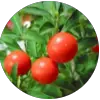
Ashwagandha Withania somnifera
I can’t speak highly enough about this sweet root that hails from India’s Ayurvedia tradition of healing. It’s one of the most effective, gentle, and respected nerve tonics around – and it’s one that I love working with.
Ashwagandha helps with sleep, relaxation, nerve and body pain, stress, and mood. It’s a super-gentle nourishing tonic that acts as a foundational support to the entire nervous system. For best results it should be used consistently. I like having it in my nighttime herbal tea 5 days a week, taking 3 days off to allow my system to adjust to its nourishment. Adding just a small pinch to your herbal tea blend is enough to get the tonic effects of this root herb.
Since most Ashwagandha is imported from India, it’s important to get a variety that’s organic, properly harvested, and transported well.
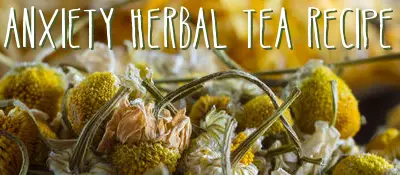
Here’s a simple, delicious, versatile herbal tea for anxiety you can blend in your own kitchen. I use this formula all the time, and I created it using herbs that are gentle, affordable, and easy to work with. I think you’ll really enjoy this one!
Josh’s Anxiety Tea Recipe
Note: A ‘part’ is any volume measurement you choose. If you want to make a big batch, a part might be a cup. For a smaller batch, a part might be a Tablespoon. So, 3 parts would be 3 Tablespoons.
5 parts Chamomile
3 parts Lemon Balm
2 parts Skullcap
1 part California Poppy
1 part Oatstraw
1 part Nettles
Optional: 1 part Passionflower as a bedtime tea
Optional: 1 part Ashwagandha Root as a tonic tea. Add 5 days per week, skip 2 days per week
Combine all herbs. Steep 1 Tablespoon in 8-10 ounces boiled water for 5 minutes. Strain, allow to cool to a safe temperature, and enjoy! While you’re sipping choose to think positive thoughts, listen to good music, grab a to-go mug and take a gentle walk outside, or just think about things that make you feel happy.
To our wellness…


References & Resources
Web MD : Anxiety & Panic Disorders
Web MD : Supplements for Anxiety

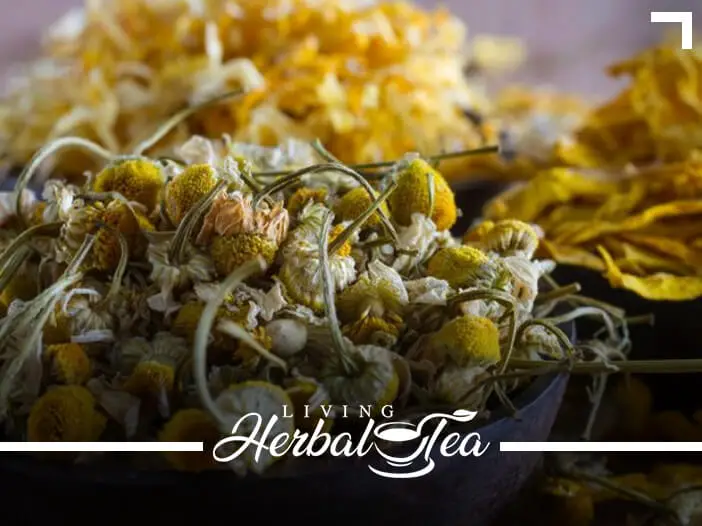
question: is the “x parts” in this recipe a VOLUME or a WEIGHT measurement? (i.e. 1 oz oatstraw/nettle/etc, 2 oz skullcap…. OR 1 tbsp oatstraw/nettle/etc, 2 tbsp skullcap…..)
Hi! Thanks for pointing this out. I usually include a little explanation, but forgot to add it. I just updated to reflect part as a volume measurement of your choice 🙂
~Josh
I am allergic to ragweed and therefore can not do chamomile tea at all. I noticed that you mix alot of these with Chamomile. Any other suggestions for a high anxiety gal?
Hi Janalee!
My second go-to base herb for all these recipes would be Lemon Balm. So good, and wonderfully calming 🙂
Thanks!
Josh
Thank you! I currently take a Lemon Balm capsule in the morning. I’ll give it a try as a tea.